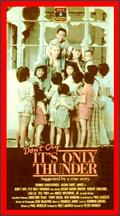
A Vietnam veteran is an individual who performed active military, naval, or air service in the Republic of Vietnam during the Vietnam War.

War film is a film genre concerned with warfare, typically about naval, air, or land battles, with combat scenes central to the drama. It has been strongly associated with the 20th century. The fateful nature of battle scenes means that war films often end with them. Themes explored include combat, survival and escape, camaraderie between soldiers, sacrifice, the futility and inhumanity of battle, the effects of war on society, and the moral and human issues raised by war. War films are often categorized by their milieu, such as the Korean War; the most popular subjects are the Second World War and the American Civil War. The stories told may be fiction, historical drama, or biographical. Critics have noted similarities between the Western and the war film.

Platoon is a 1986 American war film written and directed by Oliver Stone, starring Tom Berenger, Willem Dafoe, Charlie Sheen, Keith David, Kevin Dillon, John C. McGinley, Forest Whitaker, and Johnny Depp. It is the first film of a trilogy of Vietnam War films directed by Stone, followed by Born on the Fourth of July (1989) and Heaven & Earth (1993). The film, based on Stone's experience from the war, follows a U.S. Army volunteer (Sheen) serving in Vietnam while his Platoon Sergeant and his Squad Leader argue over the morality in the platoon and of the war itself.
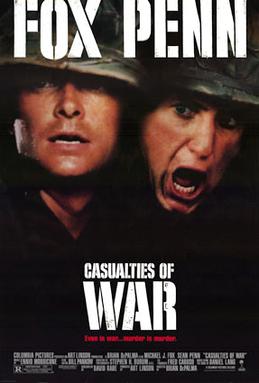
Casualties of War is a 1989 American war drama film directed by Brian De Palma and written by David Rabe, based primarily on an article written by Daniel Lang for The New Yorker in 1969, which was later published as a book. The film stars Michael J. Fox and Sean Penn, and is based on the events of the 1966 incident on Hill 192 during the Vietnam War, in which a Vietnamese woman was kidnapped from her village by a squad of American soldiers, who raped and murdered her. For the film, all names and some details of the true story were altered.
An Amerasian may refer to a person born in Asia to an Asian mother and a U.S. military father. Other terms used include War babies or G.I. babies. There are also those who may have mothers in the U.S. military or have Amerasian ancestry through their grandparents and so on.
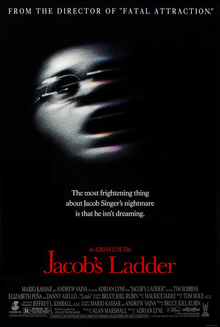
Jacob's Ladder is a 1990 American psychological horror film directed by Adrian Lyne, produced by Alan Marshall and written by Bruce Joel Rubin. The film stars Tim Robbins as Jacob Singer, an American infantryman whose experiences before and during his service in Vietnam result in strange, fragmentary visions and bizarre hallucinations that continue to haunt him. As his ordeal worsens, Jacob desperately attempts to figure out the truth. The film's supporting cast includes Elizabeth Peña and Danny Aiello.

Glory is a 1989 American historical war drama film directed by Edward Zwick about the 54th Massachusetts Infantry Regiment, one of the Union Army's earliest African-American regiments in the American Civil War. It stars Matthew Broderick as Colonel Robert Gould Shaw, the regiment's commanding officer, and Denzel Washington, Cary Elwes, and Morgan Freeman as fictional members of the 54th. The screenplay by Kevin Jarre was based on the books Lay This Laurel (1973) by Lincoln Kirstein and One Gallant Rush (1965) by Peter Burchard and the personal letters of Shaw. The film depicts the soldiers of the 54th from the formation of their regiment to their heroic actions at the Second Battle of Fort Wagner.

We Were Soldiers is a 2002 war film written and directed by Randall Wallace and starring Mel Gibson. Based on the book We Were Soldiers Once… and Young (1992) by Lieutenant General (Ret.) Hal Moore and reporter Joseph L. Galloway, it dramatizes the Battle of Ia Drang on November 14, 1965.

The Green Berets is a 1968 American war film directed by John Wayne and Ray Kellogg and starring John Wayne, David Janssen and Jim Hutton, based on the 1965 novel by Robin Moore. Much of the film was shot in the summer of 1967. Parts of the screenplay bear little relation to the novel, although the portion in which a woman seduces a North Vietnamese communist general and sets him up to be kidnapped by Americans is from the book.

Rules of Engagement is a 2000 American war legal drama film, directed by William Friedkin, written by Stephen Gaghan, from a story by Jim Webb, and starring Tommy Lee Jones and Samuel L. Jackson. Jackson plays U.S. Marine Colonel Terry Childers, who is brought to court-martial after Marines under his orders kill several civilians outside the U.S. embassy in Yemen.
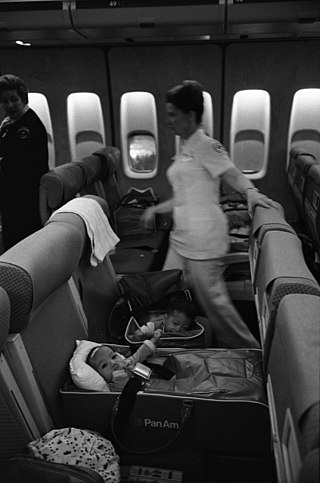
Operation Babylift was the name given to the mass evacuation of children from South Vietnam to the United States and other western countries at the end of the Vietnam War, on April 3–26, 1975. By the final American flight out of South Vietnam, over 3,300 infants and children had been airlifted, although the actual number has been variously reported. Along with Operation New Life, over 110,000 refugees were evacuated from South Vietnam at the end of the Vietnam War. Thousands of children were airlifted from Vietnam and adopted by families around the world.

The Anderson Platoon is a documentary feature by Pierre Schoendoerffer about the Vietnam War, named after the leader of the platoon - Lieutenant Joseph B. Anderson - with which Schoendeorffer was embedded. Two decades later, a sequel was released as Reminiscence.
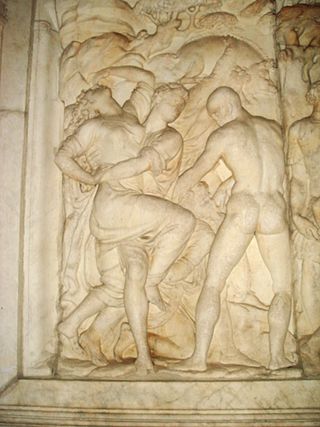
Wartime sexual violence is rape or other forms of sexual violence committed by combatants during an armed conflict, war, or military occupation often as spoils of war, but sometimes, particularly in ethnic conflict, the phenomenon has broader sociological motives. Wartime sexual violence may also include gang rape and rape with objects. It is distinguished from sexual harassment, sexual assaults and rape committed amongst troops in military service.

F.T.A. is a 1972 American documentary film starring Jane Fonda and Donald Sutherland and directed by Francine Parker, which follows a 1971 anti-Vietnam War road show for GI's, the FTA Show, as it stops in Hawaii, The Philippines, Okinawa, and Japan. It includes highlights from the show, behind the scenes footage, local performers from the countries visited, and interviews and conversations with GIs "as they discuss what they saw in battle, their anger with the military bureaucracy, and their opposition to America's presence in Indochina." Called by Fonda "a spit and a prayer production" it was far from a big budget Hollywood movie, or even a well-funded documentary. While the movie "is raw," it "underscores how infectious the movement of the 60s and 70s was", and chronicles both the Tour itself as well as the soldiers who came to see it and "the local talent of organizers, labor unions and artist/activists" in the countries visited.
In 2009 Đặng Nhật Minh's film Don't Burn, starring Tina Duong, Minh Huong and Ben Rindner, about the martyr Đặng Thùy Trâm, premiered at the International 19th Annual took place in Fukuoka, Japan, winning the audience prize. The film was released in late April 2009 in Vietnam and showed at the ASEM international film festival in Hanoi in mid-May 2009. It was also the official selection for Vietnam for the Academy Awards.
Paul G. Hensler is a screenwriter and actor. He wrote Don't Cry, It's Only Thunder, which he appeared in, and co-wrote Gotcha!
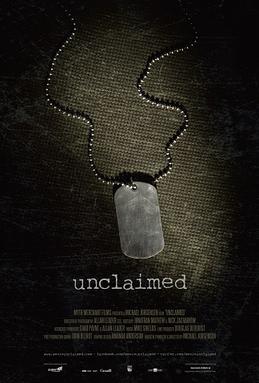
Unclaimed is a 2013 Canadian documentary film about a man who claims to be former Special Forces Green Beret Master Sgt. John Hartley Robertson, who was declared dead after being shot down over Laos on a classified mission on 20 May 1968. The documentary is written, directed, and produced by Michael Jorgensen. It follows Tom Faunce, a veteran of the Vietnam War, in tracking down the man who claimed to be Robertson. Faunce was skeptical of Robertson's identity but eventually became convinced. He convinced Jorgensen to make a documentary about Robertson's story as a way to unite the man with his American family.
Ghost soldiers or ghost battalions refers to army troops whose names appear on military rolls, but who are not actually in military service, generally in order to divert part of the soldiers' salaries to an influential local entity such as army officers or others. Soldiers may equally benefit from the corruption scheme by returning to their civilian occupation and routine while gaining marginal income. The practice, however, weakens the military and makes it susceptible to military offensives and major defeats since leaders ignore the true number of available troops at their disposal on various front-lines. Severe occurrences of ghost soldiers have been cited in Vietnam, Iraq, Afghanistan and other countries with dramatic military, humanitarian and historic consequences.

The Intrepid Four were a group of United States Navy seamen who grew to oppose what they called "the American aggression in Vietnam" and publicly deserted from the USS Intrepid in October 1967 as it docked in Japan during the Vietnam War. They were among the first American troops whose desertion was publicly announced during the war and the first within the U.S. Navy. The fact that it was a group, and not just an individual, made it more newsworthy.
Rape during the Vietnam War, as well as other acts of wartime sexual violence, was committed against Vietnamese civilians by military personnel from the United States, South Korea, and other combatants. According to American academic Elisabeth Jean Wood, wartime rape was frequently committed by U.S. troops because their commanders tolerated them. Weaver stated that not only were documented crimes against Vietnamese women by United States military personnel ignored during the international legal discourse which occurred immediately after the war, but modern feminists and other anti-war rape campaigners, as well as historians, have continued to dismiss them.
